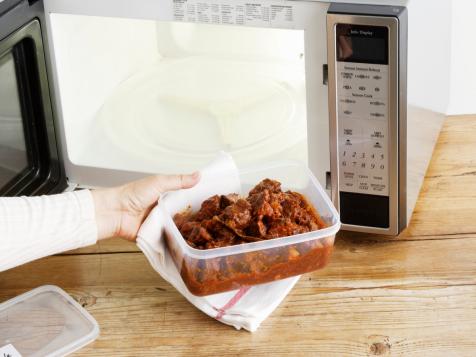Food Handlingmethods Hot Temperature Humans. Dont wrap your food with plastic cover if you are reheating or cooking in the microwave.
 Microwaves And Plastic Containers Canadian Cancer Society
Microwaves And Plastic Containers Canadian Cancer Society
BPA and phthalates are believed to be endocrine disrupters These are substances that mimic human hormones and not for the good.

Microwaving food in plastic. There is some evidence that plastic containers that arent intended for use in the microwave could melt and potentially leak chemicals into your food. No authors listed PMID. Be sure to follow manufacturers instructions as some manufacturers recommend at least an inch between the food and the plastic wrap.
Microwaving food in plastic. This applies to foods that contain fat. Plastic wrap thats designed for microwaving should be loosely placed over food.
The food plastic releases a chemical dioxins which is a cancer-causing agent. You should avoid using plastic as much as you can in your day to day kitchen routine. Dont reheat take-outs leftovers in the same restaurant provided container.
Is it Safe to Microwave Plastic. Plastic containers and wraps labeled as safe for use in the microwave dont pose a threat. These bags have a coating of glue that melts with heat and may enter in your food as you heat them.
Dont use old or damaged plastic containers in the microwave because they may have exceeded the microwave ability. While earlier reports warned that microwaved plastic released cancer-causing chemicals known as dioxins into the food Harvard Health Publishing state that it is not the case. Doing so also puts the food at risk for encountering toxic release so throw away old Tupperware or use them for purposes other that food.
16862701 PubMed - indexed for MEDLINE MeSH Terms. Use a bowl or dish with high sides. When food is wrapped in plastic or placed in a plastic container and microwaved substances used in manufacturing the plastic plasticizers may leak into the food.
Over the past several years the Food and Drug Administration FDA has been researching whether two chemicals found in plastic bisphenol-A BPA and phthalates seep into our food when warmed in the microwave and increase cancer risk. Its so convenient to pop that plastic container of food into the microwave oven for a quick. Both BPA and phthalates help make plastic the product that it is.
Dont use paper or brown bags in the microwave. 3 minutes or less. Maintain a gap between the food surface and plastic wrap.
The chemical has also been found in household dust where it settles as plastic products break down and scatter microscopic particles. Microwaves Plasticsradiation effects Substances. The main concern with microwaving plastic is that it can cause additives some of which are harmful to leach into your foods and beverages.
Set the heating temperature of the microwave oven. Plastic containers must be stamped with the microwave safe seal before they can be used in microwave. When food is wrapped in plastic or placed in a plastic container and microwaved BPA and phthalates may leak into the food.
If you are using plastic wrap in the microwave oven then you will have to follow basic steps to follow. In particular fatty foods such as meats and cheeses cause a chemical called diethylhexyl adipate. Microwaving food in plastic containers and wraps releases harmful cancer-causing substances.
BPA is the chemical used to make polycarbonate or the plastic material that stores your food while. The release of this chemical is what researchers say can be detrimental. He said that the combination of fat high heat and plastics.
However the other point that is interesting to note is that the plastic doesnt release such a. SHOULD I BE MICROWAVING FOOD IN A DISPOSABLE CONTAINER. That in fact plastic does not contain dioxins and that these chemicals are only produced when plastic metal garbage and other products are burned.
According to Rolf Halden the director for the Center for Environmental Security at the Biodesign Institute at Arizona State University the amounts of BPA and phthalates leaching into food depends on the type of plastic thats put in the microwave the amount of time its heated and the condition of the container. He said that we should not be heating our food in the microwave using plastic containers. Do not exceed fill-line.